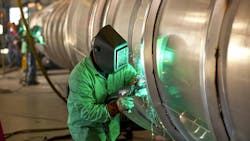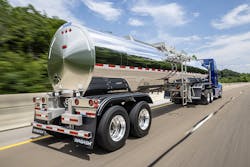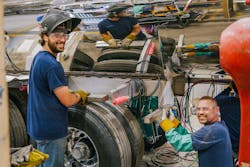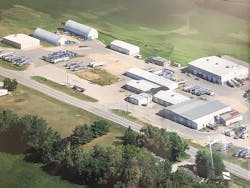John Barrett, who runs Wabash’s Mauston, Wisconsin, facility, oversees one of the largest tank trailer parts and service operations in North America.
The 40-acre campus features nine buildings, 22 service bays, six production bays, and three fabrication bays; 50 employees, including many technicians with 20-plus years of experience; and over $3 million in parts inventory—a combination of assets and capabilities that attracts customers from across the U.S. and Canada. “We have been repairing trailers here since 1962,” said Barrett, the general manager in Mauston for the last 23 years. “We have an exceptional reputation. We’re known for doing the tough jobs, the big jobs, and the hard jobs, so people have come to rely on this location. If it’s something outside the box, or outside the norm, and it’s going to be a little tougher, they send it here.
“They know we’ve got the engineering backing, OEM parts, and skilled labor for the work.”
The work keeps coming, too—more every day.
Wabash partners with fleets, distributors, and dealers, and often ships OEM parts and components directly to end users who are trying to control maintenance costs while running equipment longer amid record inflation. But tank fleets of all sizes still count on Mauston for the critical services they can’t perform themselves. “Since the coronavirus, it’s been harder to find skilled mechanics and welder/fabricators, so it’s been difficult for carriers to outfit their shops with employees,” Barrett said. “And so a lot of times they’re working more on the tractors and sending trailers our direction.”
The industry veteran recently spoke to TBB about tank trailer production and maintenance, parts availability, and Wabash’s ongoing effort to improve trailer functionality and durability; and shared three tips to help tank fleets keep equipment on the road for decades to come. “It’s not just the initial price you pay for the equipment up front,” he said. “It’s also the cost of maintenance over the lifetime of that product. That all comes into play. And as the prices increase on this equipment, our customers have an expectation that it will last longer, and to Wabash’s credit, it does.
“We’re building a better product today than we built 10 years ago.”
Parts supply and innovation
In response to customer demand and COVID-induced supply chain disruptions, Mauston manufacturers more of its own tank parts and components than in pre-pandemic times as well. “COVID was a gamechanger,” Barrett said. “We had to get creative for a few years in locating parts, procuring them, manufacturing our own parts, and doing whatever it took to get customers’ equipment back on the road.”
Parts availability and lead times are “much better,” he said. But Wabash, which produces approximately 3,500 tank trailers per year, continues to expand its vendor group and “near-source” wherever possible, allowing it to quickly dispatch parts and part assemblies to customers, and even competitor facilities.
Read more: Wabash preps for future with leadership changes
Wabash continuously enhances its trailers, too, Barrett said. The OEM introduced sanitary tank trailers with Acutherm intelligent thermal management technology two years ago. It also now offers chemical, corrosives, farm-pickup, food-grade, and DEF trailers with the “latest and greatest” safety systems and components, including roll stability and anti-lock braking (ABS), Hendrickson air-ride suspensions and tire inflation systems, GPS tracking, and third-party telematics integrations.
“Wabash leads the pack when it comes to innovation, experimentation, and technology implementation,” Barrett asserted.
Total tank trailer maintenance
Mauston leads the way in customer cooperation.
In addition to supplying parts, repairing trailers, and assisting dealers with warranty work, the facility conducts tank trailer tests and inspections for regional and national customers—and often serves as shops’ information technology department when diagnosing issues with “smart” sensors and systems. “I get calls all the time from people who say, ‘We want to put a new ABS system in, can you guys program it for us?’ Because A, they don’t have the skill, or B, they don’t have the equipment,” Barrett said.
“It’s a challenge. That’s why a facility like ours stays busy.”
To help reduce the frequency of phone calls, Barrett offers the following tips for tank trailer maintenance:
- Establish a preventative maintenance program—and stick to it. “You really need a good preventative maintenance schedule,” he said. “Fleets should have a good schedule, they should follow it with a good, thorough checklist, and not just pencil whip it but actually perform every item on the list.”
- Check trailer lights, wiring, and assemblies—religiously. “If air lines are fading, replace them,” Barrett recommended. “Don’t wait for them to leave you stuck on the side of the road. Check your fittings and make sure they’re clean, dry, and greased in the junction boxes and all the connections. The more proactive you are on lights and wiring, and the accessories that go with them, the fewer headaches you’ll have.”
- Inspect every trailer—even “non-code” tankers. “Code tanks that are hauling hazardous chemicals need tests and inspections performed on an annual basis,” Barrett explained. “But there are a lot of tanks that don’t haul hazardous chemicals, and don’t require regular HM-183 cargo tank inspections, so many people don’t inspect the inside of those tanks. That’s a mistake. They should still have a schedule for looking inside tanks for corrosion, cracks, and anything that potentially could be a problem.”
Fleets who follow that advice will keep trailers rolling long after Barrett retires.
“Even though I’ve been with this company for 41 years, I’m still super excited about the direction we’re going and culture we are cultivating,” he concluded. “That is going to help us continue to grow and produce better equipment that goes up and down the road safer. Our families travel these roads, too, so we want our customers to get their trailers where they need to go as safely as possible.”
About the Author
Jason McDaniel
Jason McDaniel, based in the Houston TX area, has nearly 20 years of experience as a journalist. He spent 15 writing and editing for daily newspapers, including the Houston Chronicle, and began covering the commercial vehicle industry in 2018. He was named editor of Bulk Transporter and Refrigerated Transporter magazines in July 2020.





